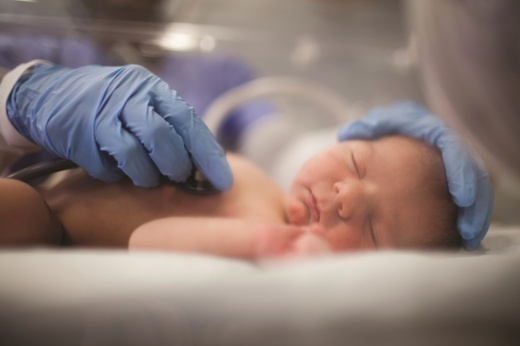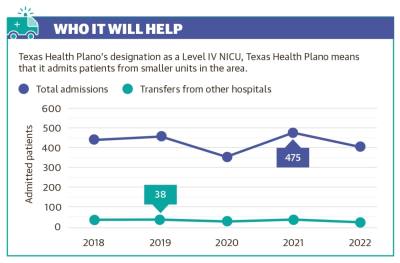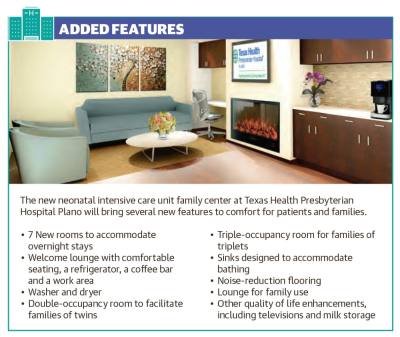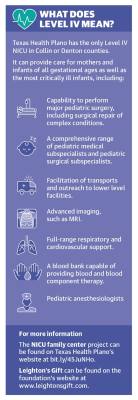Construction began May 18 on the hospital’s new family center for its neonatal intensive care unit, or NICU. The project will add seven private rooms for NICU patients and families, including one for twins and one for triplets. The family center will also include a welcome lounge with a coffee bar.
Texas Health Plano has the only Level IV NICU in Collin or Denton counties, meaning more families will see extended stays at the hospital.
Level IV NICUs are capable of providing the most intensive care for newborns—whether that’s major surgeries or treatment for complex conditions. Texas Health Plano President Fraser Hay said in a news release the designation comes with “greater responsibility and demand for service.”
Construction is scheduled to finish in the fall, and Jessica Reese, Texas Health Plano NICU nurse manager, said the additional rooms will allow families to be closer to their newborns while they receive treatment.
“Our big goal here is to make an area where babies can get the intensive medical care that they need, and the families are able to be involved in every part of that,” she said.
Texas Health Plano is the only hospital with a Level IV NICU in Collin or Denton counties, meaning it provides care to the most critically ill babies in the area.
A personal experience
Parents Amy and Chris Skaggs know how important that proximity to their child can be.
The Skaggses had twins, Jaxon and Leighton, admitted to the NICU at Texas Health Plano in 2011 and had to commute from their home in Celina daily.
“I say that the NICU was like a roller coaster—extreme highs and extreme lows; one step forward and then two steps back,” Chris Skaggs said.
Jaxon spent 74 days in the NICU before coming home, but hospital staff weren’t able to save Leighton. Not long after, the couple started a nonprofit called Leighton’s Gift to help families in the NICU.
“She was only here for three weeks, but we want her to have a purpose and a legacy,” Chris Skaggs said of Leighton.
The organization’s first project was installing 45 cameras—one for each bed—at Texas Health Plano, and the Skaggses jumped at the opportunity to partner with the hospital to help fund the family center.
“The cameras, the family center, all of them are things we would have used infinitely while we were there for 74 days,” Chris Skaggs said. “We can totally see the use for it. It’s not just a new fountain in the lobby. It’s stuff we would have absolutely used.”
The NICU family center is especially important for the Skaggses because their inspiration for starting Leighton’s Gift was the hospital’s bereavement room, which was donated by a family that went through a similar tragedy.
Amy Skaggs called helping with the project a “full circle moment.”
“That’s the only home [Leighton] ever knew,” Amy Skaggs said. “So to have the opportunity to give back in that capacity is so special.”
Why it’s needed
Texas Health Plano had 406 NICU admissions in 2022, a total that is on par with admissions over the last decade.
The Level IV designation also means the hospital has a lot of those patients transferred from smaller units, and many have long stays in the NICU. Reese said those stays can last several months, making the accommodations in the family center more crucial during those long stays.
“We end up having these sicker, smaller babies that stay a lot longer,” she said. “We have babies that can stay for seven or eight months in the NICU—that’s a really, really long time to have people away from their babies. ... [The family center] just allows the families to stay with the patient, instead of having to go back and forth to the hospital.”
Reese added that many patients require additional care after leaving the NICU, whether that is with oxygen machines or other equipment. She said the private rooms will be useful for families with babies about to be discharged from the NICU.
“It’ll allow the parents some time to get really comfortable with the equipment and things that are going home with the baby,” Reese said. “That way they can just feel more prepared before they leave.”
The existing NICU is set up in a pod structure, with several patients separated by curtains. Another major reason for the family center is to give families privacy NICUs don’t always provide, Reese said.
“When I first became a NICU nurse, everything was kind of like an open room—the babies and the families were all in this big open space that didn’t provide a lot of privacy for the families,” she said. “Over the years, the design of NICUs has moved to more private rooms. That’s where we’re leaning, and this is just the first stage in that without having to give us a whole brand-new NICU.”
The Skaggses are hoping the family center can restore some comfort for families that have extended NICU stays.
“What you normally have with the baby, like the first bottle or the first bath, that’s in a hospital setting,” Chris Skaggs said. “I think with those rooms, you can have a little bit more of that comfort. It brings some of those comforts of home and a little bit of normalcy to a completely abnormal situation.”








